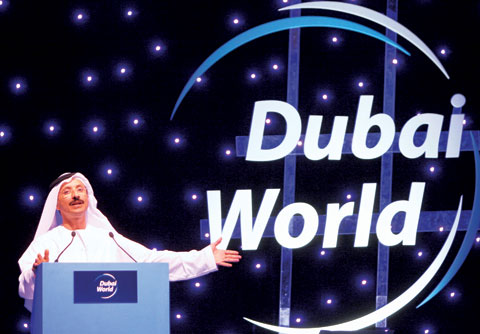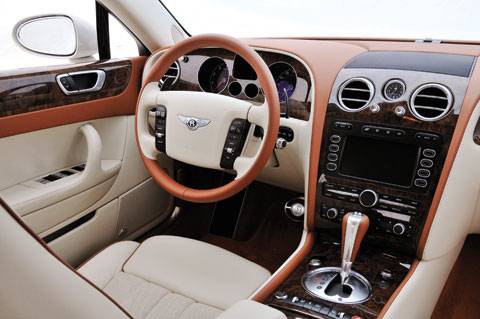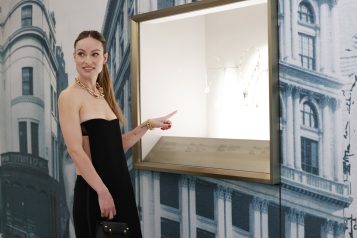As the sun rises over the dunes following another mystical Arabian night, faint silhouettes of a city skyline come into view. Past brushy desert landscapes speckled with camels on miles of empty highway, a city unfurls before the eye, conjuring the metropolitan grandeur of Manhattan or Chicago. As the brilliant sun reaches its zenith, its rays glisten on the warm waters of the Gulf and lead the eye to a man-made archipelago of islands, the largest of which is miraculously set in the shape of a palm.
This is Dubai. A city full of life, but more full of promise for what can be—a city where the sound of “impossible” is seldom heard. If the city’s collection of cookie-cutter-shaped islands is known as the universe, then Sultan Ahmed bin Sulayem is certainly at the center of the universe. Chairman of Dubai World, and dubbed one of the top five most influential Arabs on earth, this endearing, well-spoken man has the world’s attention transfixed on the small city-state he calls home. But Sulayem’s empire reaches far beyond the shores of Dubai. Now, more than ever, the world is taking note and embracing Dubai as a true force to reckon with. Be it on the ports of Britain or in the urban depths of New York City, Dubai World’s indelible mark is here to stay.
“There is nothing more exciting than growing up with your hometown,” says Sulayem, with the energetic fervor that he is known and loved for. “Dubai challenges its people to grow along with it. Our leaders had the courage and foresight to bring the world to Dubai, and now Dubai is growing across the world. For me, personally, this progress has meant privilege because I’m actively participating in and contributing to it even as it happens. The open spaces and desert sands I played in as a child are now occupied by schools, universities, hospitals, and corporate houses. The roads I walked are now throbbing with life, and our buildings are reaching out to the sky. What can make one more proud?”
And proud he must be. Sulayem now oversees more than 80 companies, including the world renowned (and sometimes controversial) Dubai Ports World, Istithmar World, Limitless, Dubai Multi Commodities Centre, and, of course, Nakheel, the real estate powerhouse behind the Palm Islands. Each company has achieved unparalleled success in its industry. Dubai Ports World now manages more than 51 terminals spanning 24 countries on five continents. The most impressive acquisition in its roster was a never before seen $6.8 billion takeover of Britain’s P&O. Similarly, Istithmar is leading the way with historic partnerships with Kerzner International, MGM Mirage, Starwood Hotels & Resorts, and Barneys New York. Dubai World also made headlines with the historic purchase of the Queen Elizabeth 2, the legendary Cunard liner that it hopes to convert into a permanently docked luxury floating resort.
Sulayem is a driving force in the present and future of Dubai, but he will attribute every ounce of his success to Sheikh Mohammed bin Rashid al Maktoum, Ruler of Dubai and Prime Minister of the greater United Arab Emirates. “It was the encouragement he gave me, and the challenges he presented me with, that helped me shape up my career,” he fondly recalls. Educated at Philadelphia’s Temple University, Sulayem began his career at Dubai Customs. When Dubai first formed its Jebel Ali Free Zone in 1985, Sulayem was heavily involved in its success and growth. It is now one of the largest free trade zones in the world, comprising more than 5,000 companies from 100 countries. “In the early days of my career, when I was with Customs, Sheikh Mohammed asked me what I thought of free zones. I said it was a great idea and he put me in charge. It was scary and a daunting challenge, but one that I took on with commitment. That was the beginning of Jebel Ali Free Zone, now one of the biggest in the world.”
Then came Nakheel, the once little-known real estate company that humbly hoped to increase the shoreline of Dubai but ended up making history. “Nakheel is special for me because it’s a massive project that changed the very face of Dubai, and it began with a simple desire of Sheikh Mohammed to do something that no one has done before. It makes me proud to see our ideas are being emulated all over the region.” He pauses for a moment and, unable to resist a great anecdote, begins to explain the idea behind the Palm concept. “Nakheel’s island concept was also Sheikh Mohammed’s idea. In 1997, when our focus was on developing Dubai’s tourism potential, Sheikh Mohammed told me that with all this tourism, we won’t have enough beaches. So why not plan an island? The conversation took only five minutes. I asked someone to design an island. He came up with a regular, circular island with a seven kilometer beachfront. When Sheikh Mohammed saw it he asked: ‘Why should an island be circular at all? And why just seven and not 70?’ That did it. The Palm Island was born. Once all of our islands and waterfront projects are completed, we will have about 1,500 kilometers of beachfront. This is what inspiration can do for you!” Nakheel now has three Palm islands, the 300-island World project, and Dubai Waterfront—the most ambitious reclamation project in the world comprising of more than 250 master-planned communities in the works. With nearly every international real estate, hospitality, and entertainment name, from Island Global Yachting to Kerzner International and the Trump Organization, on its dream team, Nakheel is sure to succeed in its every project.
But, of course, helming such a diversified empire doesn’t come without its challenges. “The biggest challenge, to be honest, has been to keep pace with HH Sheikh Mohammed’s vision for growth and progress!” he says with a smile. “Dubai World, as the parent company of some of the fastest growing and most well-known firms in the world, is global in its operations. It has to follow a unified growth pattern while the different subsidiary units operating in different sectors are doing business in different markets across the world. Each sector and each market has its own unique speed. The Asian market we operate from is very different from the African market. DP World is in port operations while Nakheel is in urban development. Each has its own way of responding to the needs of the local environment. Each one needs to fit into that picture while we also have to achieve a uniformly positive result on all our investments. This is a formidable challenge,” he adds.
With this tireless work and great success comes a string of well-deserved accolades, including “Global Leader of Tomorrow” by the World Economic Forum. A regular attendee at Davos, Sulayem raised more than a few eyebrows when he threatened to withdraw interests in Europe if the continent’s regulators moved to limit the activity of sovereign wealth funds. The future will see Dubai World’s immense success blossom in its international interests that exist in every corner of the world. Dubai Ports World is now pursuing interests in commodity rich Africa. Through his Istithmar World arm, Sulayem again caused a stir when he teamed up with Sol Kerzner to invest in a sweeping 78-acre resort site in the heart of Las Vegas—a bold move for an investor from a Muslim country where gambling is illegal. But Sulayem shrugs off criticism and states, “The Las Vegas market is one which we firmly believe will continue to expand and attract visitors from around the world.” The hospitality facet of Nakheel/Istithmar is pursuing various interests in the Far East, having recently broken ground on a W branded hotel in Bangkok, as well as a $15 million euro investment in Europe, in partnership with Starwood Hotels & Resorts and Jones Lang LaSalle. Speaking to the importance of his international ventures, Sulayem says, “Innovation and forward thinking are leading the way on how businesses and national economies are efficiently managed. In today’s globalized, technology-driven environment, no nation, no enterprise needs to feel trapped by geography or scales of economies.”
There is little doubt that within a matter of years, Dubai will be a star on every global stage, whether it be commodities, tourism, real estate, investment, or international port trade. But then again, this is no large feat for a country that has exponentially increased its reputation and its investments in a matter of two decades. For a city where, now, not even the sky can offer any limits, the question remains, will Dubai emerge as the next world leader?





















